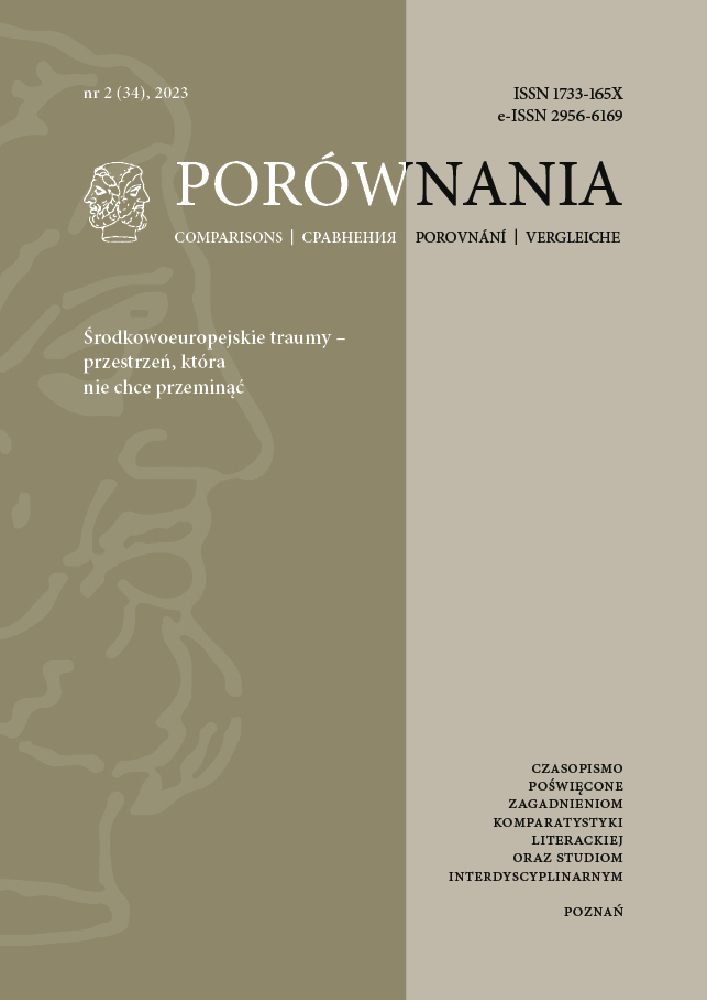Abstract
The article takes up the issue of space in the economics and philosophy of capitalism. Based on excerpts from Marx’s writings, I reconstruct the idea of annihilation of space and the metabolic rift. Using James Moor’s contemporary interpretations of these concepts, the article discusses industrial spaces in the Capitalocene. The perspective of the oikos, combining economics and ecology, has allowed me a new perspective on the issues of industrialization and deindustrialization and a reading of different cultural texts that deal with the issue of human impact on the environment. The second part of the article describes examples of degradation of the landscape of the Upper Silesian Coal Basin, portrayed in selected films and photographs. The conclusion asks about the possibility of a hermeneutics of industrial space: the possibility of life after the disaster and the creation of meaning in a tentacular entanglement with beings other than humans.
References
Bińczyk, Ewa. Epoka człowieka. Retoryka i marazm antropocenu. Warszawa: PWN, 2018.
Braudel, Fernand. “Civilization and Capitalism, 15th–18th Century.” Vol. 3: The Perspective of the World. Trans. Sian Reynolds. London: Collins, 1984.
Braudel, Fernand. “Civilization and Capitalism, 15th-18th Century.” Vol. 2: The Wheels of Commerce. Trans. Sian Reynolds. London: Book Club Associates, 1982.
Chakrabarty, Dipesh. “The Climate of History: Four Theses.” Critical Inquiry 2 (2009): 197–222. DOI: https://doi.org/10.1086/596640
Crane, Ralph. Coal. Nature and Culture. London: Reaktion Books, 2021.
Dante, Alighieri. The divine comedy of Dante Alighieri. Vol. 1: Inferno. Ed. and transl. Robert M. Durling. London–New York: Oxford University Press, 1996.
Debord, Guy. The Society of the Spectacle. Trans. Donald Nicholson-Smith. New York: Zone Books, 1995.
Delorme, Andrew. Antyekologiczna spuścizna totalitaryzmu. Kraków: Secesja, 1995.
Edensor, Tim. Industrial Ruins: Space, Aesthetics and Materiality. London: Bloomsbury Publishing, 2005. DOI: https://doi.org/10.5040/9781474214940
Fair, Henry J. Industrial Scars: The Hidden Costs of Consumption. Winterbourne: Papadakis, 2019.
Falb, Daniel. Geospekulationen. Leipzig: Merve Verlag, 2019.
Franco, Zecchin. Śląsk, jakiego nie chcemy oglądać. Ed. Małgorzata Chraścina. Katowice: Centrum Studiów nad Człowiekiem i Środowiskiem Uniwersytetu Śląskiego, 1993.
Guin, Ursula K. Le. Buffalo Gals and Other Animal Presences. Santa Barbara: Capra Press, 1990.
Gumińska, Maria and Andrzej Delorme, ed. Klęska ekologiczna Krakowa. Przyczyny, teraźniejszość, perspektywy ekorozwoju miasta. Kraków: PKE, 1990.
Haraway, Donna J. Staying with the Trouble: Making Kin in the Chthulucene. Durham: Duke University Press, 2016. DOI: https://doi.org/10.2307/j.ctv11cw25q
Horn, Eva and Hannes Bergthaller. The Anthropocene: Key Issues for the Humanities. Abingdon: Routledge, 2020. DOI: https://doi.org/10.4324/9780429439735
Jameson, Frederic. Postmodernism, or the Cultural Logic of Late Capitalism. Durham: Duke University Press, 1991. DOI: https://doi.org/10.1215/9780822378419
Karpinski, Andrzej et al. Od uprzemysłowienia w PRL do deindustrializacji kraju. Losy zakładów przemysłowych po 1945 roku. Warszawa: Muza SA, 2015.
Leńkowa, Antonina. Oskalpowana Ziemia. Katowice: Wydawnictwo „Śląsk”, 1988.
Marchacz, Władysław. Krajobraz Śląska Polskiego. Katowice: Kasa im. Mianowskiego – Instytut Popierania Nauki, 1936.
Marx, Karl. Capital. A Critique of Political Economy. Vol. 1. Trans. Ben Fowkes. London: Penguin Book, New Left Review, 1992.
Marx, Karl. Grundrisse. Foundations of the Critique of Political Economy (Rough Draft). Trans. Martin Nicolaus. London: Penguin Books, New Left Review, 1993.
Moore, Jason W. “Environmental Crises and the Metabolic Rift in World-Historical Perspective.” Organization & Environment 2 (2000): 123–157. DOI: https://doi.org/10.1177/1086026600132001
Moore, Jason W. “Nature and the Transition from Feudalism to Capitalism.” Ecology of the Modern World System 26.2 (2003): 97–172.
Moore, Jason W. Capitalism in the Web of Life Ecology and the Accumulation of Capital. London: Verso, 2015.
Moore, Jason W., ed. Anthropocene or Capitalocene? Nature, History, and the Crisis of Capitalism. Oakland: PM Press, 2016.
Morton, Timothy. Hyperobjects: Philosophy and Ecology After the End of the World. Minneapolis: University of Minnesota Press, 2013.
Niedoba, Barbara, ed. Robert Schneider: malarstwo, rysunek. Katalog wystawy. Katowice: Muzeum Śląskie, 1997.
Nolte, Ernst. Vergangenheit, die nicht vergehen will. Eine Rede, die geschrieben, aber nicht gehalten werden konnte, in “Historikerstreit” Die Dokumentation der Kontroverse um die Einzigartigkeit der nationalsozialistischen Judenvernichtung. München Zürich: Piper, 1987.
Pollack, Martin. Kontaminierte Landschaften. St. Pölten: Residenz Verlag, 2014.
Raphael, Lutz. Jenseits von Kohle und Stahl. Eine Gesellschaftsgeschichte Westeuropas nach dem Boom. Berlin: Suhrkamp, 2019.
Saito, Kohei. Karl Marx’s Ecosocialism: Capital, Nature, and the Unfinished Critique of Political Economy. New York: Monthly Review Press, 2017. DOI: https://doi.org/10.2307/j.ctt1gk099m
Storm, Anna. Post-Industrial Landscape Scars. New York: Palgrave Macmillan, 2014. DOI: https://doi.org/10.1057/9781137025999
Tomczok, Paweł. “Komparatystyka wobec rewolucji przemysłowej.” Wielogłos 1 (2022): 71–95. 22.011.16604 DOI: https://doi.org/10.4467/2084395XWI.22.011.16604
Tsing, Anna Lowenhaupt. The Mushroom at the End of the World. On the Possibility of Life in Capitalist Ruins. Princeton–Oxford: Princeton University Press, 2015. DOI: https://doi.org/10.1515/9781400873548
Wilczyk, Wojciech. Czarno-biały Śląsk. Kraków–Katowice: Galeria Zderzak, Górnośląskie Centrum Kultury, 2004.
Williams, Raymond. Problems in Materialism and Culture. London: Verso, 1980.
Wójcik, Jan. Antropogeniczne zmiany środowiska przyrodniczego Ziemi. Warszawa: PWN, 2020.
Zieliński, Jerzy, ed. Dajcie szansę Ziemi. Warszawa: Książka i Wiedza, 1971.
License
Copyright (c) 2023 Paweł Tomczok

This work is licensed under a Creative Commons Attribution-NoDerivatives 4.0 International License.
Utwory opublikowane w czasopiśmie „Porównania”, na platformie Pressto należącej do Uniwersytetu im. Adama Mickiewicza w Poznaniu są udostępniane na licencji Creative Commons Uznanie autorstwa - Bez utworów zależnych 4.0 Międzynarodowe (CC BY-ND 4.0)
Tym samym wszyscy zainteresowani są uprawnieni do korzystania z utworów opublikowanych pod następującymi warunkami:
-
uznania autorstwa — czyli obowiązek podania wraz z rozpowszechnianym utworem informacji o autorstwie, tytule, źródle (odnośniki do oryginalnego utworu, doi) oraz samej licencji
-
bez utworów zależnych — remiksując, przetwarzając lub tworząc na podstawie utworu, nie wolno rozpowszechniać zmodyfikowanych treści.
-
brak dodatkowych ograniczeń — nie można korzystać ze środków prawnych lub technologicznych, które ograniczają innych w korzystaniu z utworu na warunkach określonych w licencji.
Uniwersytet im. Adama Mickiewicza w Poznaniu zachowuje prawo do czasopisma jako całości (układ, forma graficzna, tytuł, projekt okładki, logo itp.).
Autor zachowuje prawa majątkowe, ale udziela zgody Uniwersytetowi im. Adama Mickiewicza w Poznaniu na wykorzystanie dzieła. Autorzy tekstów zakwalifikowanych do publikacji proszeni są o wypełnienie podpisanie i przesłanie umowa (PL) agreement (EN)
Agreement for granting a royalty-free license to works with a commitment to grant a CC sub-license





